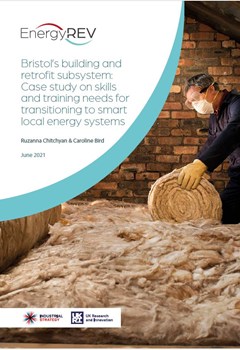Ruzanna Chitchyan and Caroline Bird
July 2021
As the UK’s energy system changes, our buildings play a key role in contributing to both energy generation, through roof mounted PV etc. and consumption, eg. through energy used for heating and lighting. Traditional building methods are no longer adequate, and the workforce must be upskilled in order to meet the need for new approaches to building and retrofit.
We consider this in the context of a case study of the city of Bristol where we note two key factors of influence, negative and positive respectively:
• The ethos of the UK building industry, which is seen as conservative and building to minimum standards, coupled with low levels of qualification requirements
• The climate emergency challenge driven by the national agenda and reinforced by the local city council
Our analysis explores these issues and identifies three main challenges faced by Bristol’s Building and Retrofit sector in ensuring the availability of the skills needed to support the transition to smart local energy systems
1. Motivating the current workforce to both take up available training and adopt modern building and retrofit practices
2. Attracting young people into the sector
3. Navigating the transition path equitably in order to avoid obsolescence of sector workers.
The report lists the skills growth required across building and retrofit activity in Bristol and recommends areas of training need and modes of delivery to meet the challenges. The Bristol case study is intended to serve as an example for comparison in other localities.
Tags: Work; equity; sectors; supply; built sector; heat; light; power; trades; design; engineering; finance; legal; managerial
